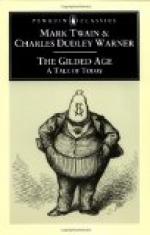The dining room was long, low and narrow, and a narrow table extended its whole length. Upon this was spread a cloth which from appearance might have been as long in use as the towel in the barroom. Upon the table was the usual service, the heavy, much nicked stone ware, the row of plated and rusty castors, the sugar bowls with the zinc tea-spoons sticking up in them, the piles of yellow biscuits, the discouraged-looking plates of butter. The landlord waited, and Philip was pleased to observe the change in his manner. In the barroom he was the conciliatory landlord. Standing behind his guests at table, he had an air of peremptory patronage, and the voice in which he shot out the inquiry, as he seized Philip’s plate, “Beefsteak or liver?” quite took away Philip’s power of choice. He begged for a glass of milk, after trying that green hued compound called coffee, and made his breakfast out of that and some hard crackers which seemed to have been imported into Ilium before the introduction of the iron horse, and to have withstood a ten years siege of regular boarders, Greeks and others.
The land that Philip had come to look at was at least five miles distant from Ilium station. A corner of it touched the railroad, but the rest was pretty much an unbroken wilderness, eight or ten thousand acres of rough country, most of it such a mountain range as he saw at Ilium.
His first step was to hire three woodsmen to accompany him. By their help he built a log hut, and established a camp on the land, and then began his explorations, mapping down his survey as he went along, noting the timber, and the lay of the land, and making superficial observations as to the prospect of coal.
The landlord at Ilium endeavored to persuade Philip to hire the services of a witch-hazel professor of that region, who could walk over the land with his wand and tell him infallibly whether it contained coal, and exactly where the strata ran. But Philip preferred to trust to his own study of the country, and his knowledge of the geological formation. He spent a month in traveling over the land and making calculations; and made up his mind that a fine vein of coal ran through the mountain about a mile from the railroad, and that the place to run in a tunnel was half way towards its summit.
Acting with his usual promptness, Philip, with the consent of Mr. Bolton, broke ground there at once, and, before snow came, had some rude buildings up, and was ready for active operations in the spring. It was true that there were no outcroppings of coal at the place, and the people at Ilium said he “mought as well dig for plug terbaccer there;” but Philip had great faith in the uniformity of nature’s operations in ages past, and he had no doubt that he should strike at this spot the rich vein that had made the fortune of the Golden Briar Company.




